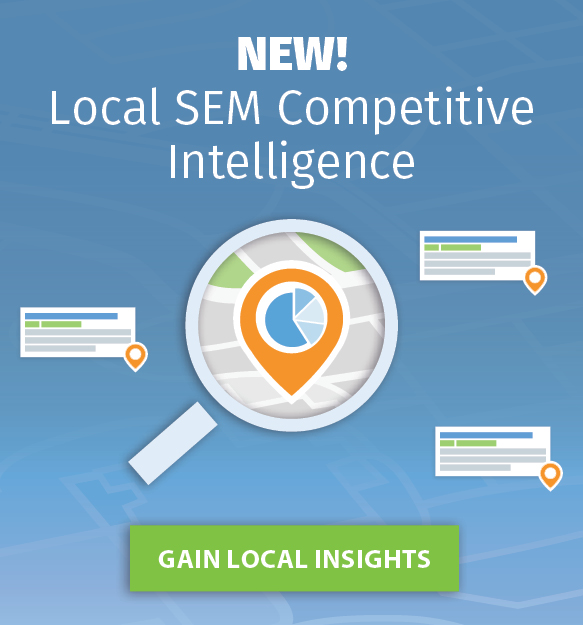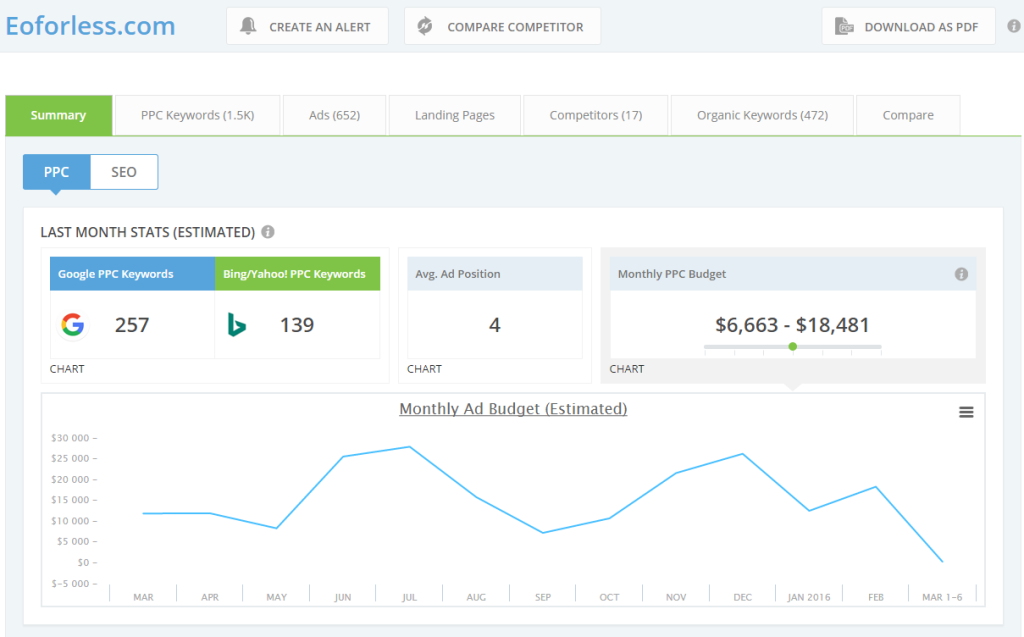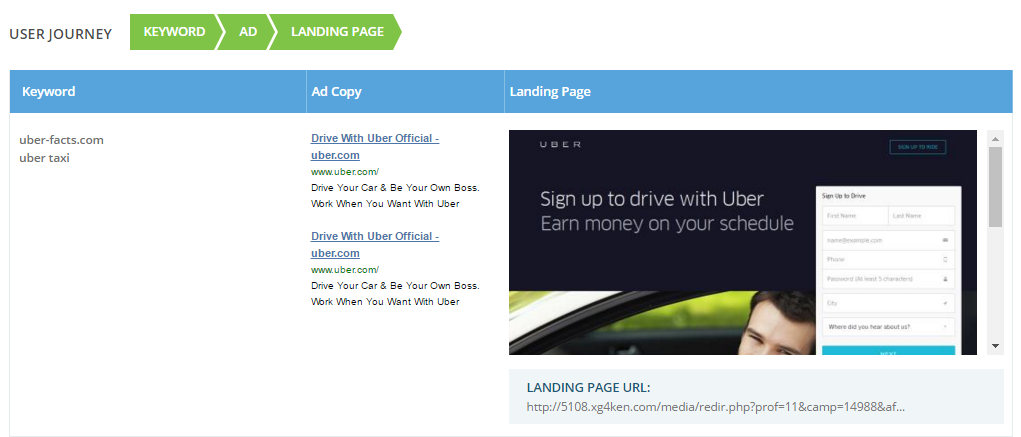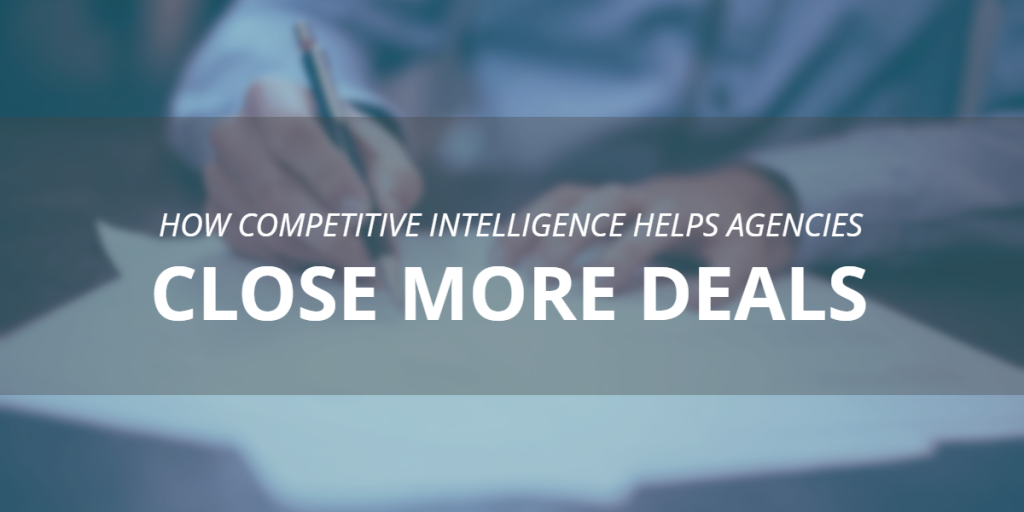
One question that we get quite often from our agency clients is this:
How can I increase my close rate using iSpionage competitive intelligence data.
To answer the question above, we conducted a survey to our business users on behalf of our agency clients. We asked the following open ended question: “What is your biggest business challenge?”
Here are the main responses we received, ranked in order:
- Getting more sales/leads
- Increasing conversions
- Getting more traffic
- Beating competitors
- Effective digital marketing campaigns
 If you look at this list carefully, they’re all connected in this way:
If you look at this list carefully, they’re all connected in this way:
IF you have an effective digital marketing campaign,
THEN you’ll have a website that converts and leads to an increase in sales,
which then allows you to pour in more marketing dollar to bring in more traffic.
In the end, it all boils down to traffic and conversions.
So…if you can lay out a BELIEVABLE plan for your prospect to increase their traffic and conversions, then you’re a solution provider that every business would love to work with!
And in order come up with a BELIEVABLE plan, you need to look like the smartest person in the room in order to gain their trust.
We’ve got great news.
iSpionage competitive intelligence helps you look like the smartest person in the room!
Competitive intelligence brings to light information that otherwise would be hard or impossible for businesses to get.
With that in mind, here are some specific ways iSpionage helps you to close more deals.
1) It helps to set the right budget expectation
One of the most common question business owners have is this: How much do I need to spend for a profitable digital marketing campaign?
The answer is that it depends on many factors, and the main ones are these:
- The site’s conversion rate,
- Whether they have an effective nurturing program that can convert leads into sales
But of course some people need a number to base their estimate off of. So, when needed, you can use iSpionage data to give prospects a ballpark amount of how much their competitors are spending on PPC. In the screenshot below, for example, you could tell a prospect that Eoforless.com spends somewhere between $6,663 and $18,481 per month on PPC.
What’s great about this is that iSpionage provides you with an instant PPC budget estimate, which means everything’s already done for you.
And in case you’re wondering, the budget is derived from the number of keywords an advertiser used in the previous month, their cost per click estimates, and their average ad position.
You should also know that getting 100% accurate PPC spend estimates is impossible because we don’t have access to advertisers’ Google Adwords accounts. On top of that Google is an auction platform where actual cost per click varies in real time.
But you can get a sense of an advertiser’s spending trend and a ball park figure to help you set a right expectation with your prospective customers.
If your prospect already has an existing campaign, you can also ask them how much they are spending in order to calibrate iSpionage data more accurately.
Once you calibrate your prospect’s PPC budget, the same factor (whether it’s 2x, 4x) will be applied to every advertiser that you search for. Thus you will get much more accurate estimates.

With the PPC Budget Estimation Adjuster functionality you can calibrate and adjust PPC budgets of every advertiser you search for, thus it will give you a more accurate estimate.
2) Analyze your prospect’s competitor landing pages and come up with suggestions to improve the user experience
To increase sales and revenue, your prospect needs to have a converting website. More traffic without a converting website is pretty much the same as throwing money out of the window or lighting it on fire.
The good news is that you can use the iSpionage “USER JOURNEY” report to show your prospect how good (or bad) their competitors are and to come up with landing page conversion ideas for your prospect.
By visually showing prospects their competitors’ offers and landing pages, you now have the data and evidence to back up your recommendations should you think their website and offer are not up to par with their competitors.
You see, in this digital age, end users are constantly evaluating and comparing offers from one business against others.
According to McKinsey, the consumer decision journey now looks like this:
 The decision-making process is now a circular journey with four phases: initial consideration; active evaluation, or the process of researching potential purchases; closure, when consumers buy brands; and post purchase, when consumers experience them. (Source: http://www.mckinsey.com/business-functions/marketing-and-sales/our-insights/the-consumer-decision-journey)
The decision-making process is now a circular journey with four phases: initial consideration; active evaluation, or the process of researching potential purchases; closure, when consumers buy brands; and post purchase, when consumers experience them. (Source: http://www.mckinsey.com/business-functions/marketing-and-sales/our-insights/the-consumer-decision-journey)
In the current digital marketplace we find ourselves in where competitor’s websites s are only one click away at any point in the buying process, it’s important to understand what competitors’ offers are so that you can advise your prospect about what needs to be done on the landing page before they launch their campaign to drive traffic to it.
This conversation is important to have because it shows that you care about your prospects ROI and not just increasing their marketing budget spend which will increase your management fees as well.
3) Show your prospect that you have their competitors’ working PPC Keywords
The typical PPC campaign goes like this:

Step 2 to 4 are the learning curve where you need to do a lot of trial and error to come up with converting keyword, ad copy, and landing page combinations.
But with iSpionage data, you can shortcut the whole process!
iSpionage not only captures the keywords that advertisers use, but also applies a proprietary ranking algorithm called KEI (Keyword Effectiveness Index) to let users know which keywords work well for their competitors.

The logic goes like this:
IF an advertiser uses a set of keywords with high search volume AND has been using them for a long time AND is still using them, THEN chances are good that these are the best performing keywords for the advertiser!
If you show your prospect that you have their competitors’ top performing keywords that are ready to use, you will save them tons of resources, and thus will gain their trust.
4) Suggest the right content for SEO campaigns
iSpionage monitors SERP results for more than 90M keywords in the US, UK, and Canada. This allows us to see which organic keywords advertisers rank for in addition to which PPC keywords they’re bidding on.
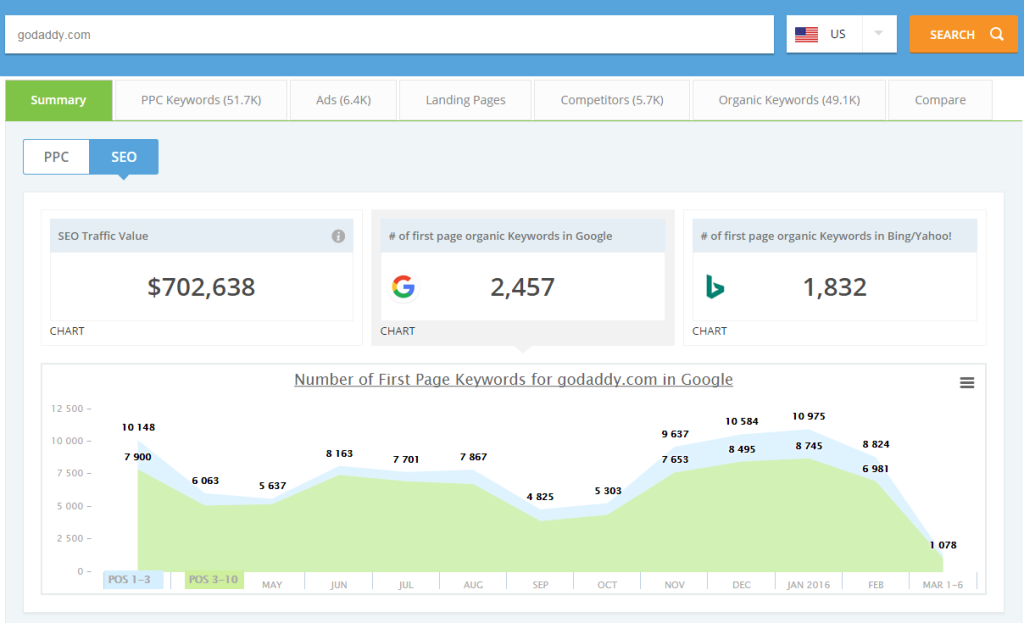
In the example above we see Godaddy.com has more than 2K keywords on the first page of Google and 1.8K in Bing (organic keywords).
Drilling down on the organic keyword report, you will get a list of keywords that a particular website ranks highly for.

If your prospect happens to be selling web hosting services, these are the topics that they’ll want to write about!
This type of SEO keyword intelligence is almost impossible to get, especially due to the fact that Google Analytics now hides the majority of the organic keywords as “not provided.”
Not only can you provide your prospect with the missing data from their Google Analytics account, but you can also provide them with an x-ray vision of what works for their competitors.
If you include this data in your proposal to your prospect, you’ll look amazingly smart and trustworthy!
5) Provide landing page design recommendations
This is similar to point #2. With iSpionage you can learn about competitors landing pages and offers quickly. You can study them and provide landing page recommendations to your prospects in a gallery style view.
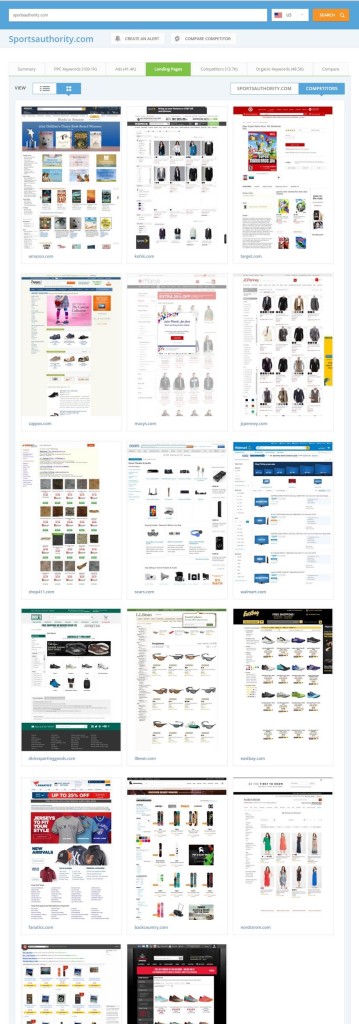
When you show your prospect the BROAD and IN-DEPTH knowledge you have about their market, naturally you’ll look like the smartest person in the room.
And this is precisely how you can utilize iSpionage competitive intelligence data to close more deals.
Here’s a quick recap…
iSpionage competitive intelligence data helps you close more deals by:
- Helping you set the right budget expectations
- Analyze competitor landing pages so you can make recommendations for your prospect
- Show prospects their competitors’ top performing keywords
- Suggest the right content for SEO campaigns
- Provide landing page design recommendations.
So what are you waiting for? Visit www.ispionage.com today to try iSpionage out for free and to learn how our competitive intelligence data will help you to close more leads and generate more sales!
